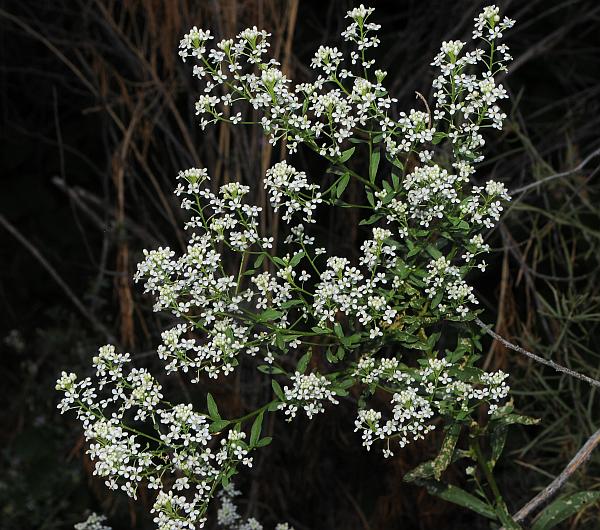Lepidium latifolium L.
Perennial Pepper Grass

Introduced
CC = *
CW = 0
MOC = 1
© SRTurner
Lepidium latifolium L.Perennial Pepper Grass | |
 |
Introduced CC = * CW = 0 MOC = 1 |
© SRTurner |
|
Family - Brassicaceae Habit - Rhizomatous perennial forb. Stem - Ascending to erect, to 1.2 m, mostly unbranched, glabrous or nearly so.
Leaves - Basal and alternate, simple, 1-30 cm long, linear to oblanceolate or elliptic in outline, the base not clasping, glabrous, the margins entire or finely toothed, the lower and middle ones petiolate, the upper leaves progressively reduced and sessile.
Inflorescence - Panicles, typically crowded with numerous flowers. Bracts absent.
Flowers - Sepals 0.8-1.5 mm long, broadly elliptic to ovate. Petals 1.5-2.5 mm long, white. Stamens 6. Styles absent.
Fruits - Silicles 1.8-2.2 mm long, broadly ovate to nearly circular in outline, the tip rounded, not notched or winged, flattened, sparsely hairy or glabrous. Seeds 1.0-1.3 mm long, oblong-elliptic in outline, not winged, the surface with a very fine, netlike or honeycomb-like pattern of ridges and pits, brownish orange.
Flowering - June - August Habitat - Open disturbed areas. Origin - Native to Eurasia. Lookalikes - Other species of Lepidium, particularly L. chalepense and L. draba. Other info. - This species is very rare in Missouri, known from only one site on the far western edge of the state. It is far more common to our west, and in fact is considered a noxious weed in many western states, where the above photographs were taken. The plant is reasonably easy to identify; it is the only Missouri species of Lepidium having both 6 stamens per flower and leaves which do not clasp the stem. Photographs taken in Grandstaff Canyon, Grand County, UT, 08-06-2017, Fort Morgan, Morgan County, CO, 06-19-2018, Dinosaur National Monument, Uintah County, UT, 06-27-2018, and along a roadside in Granite County, Montana, 8-15-2019 (SRTurner). |